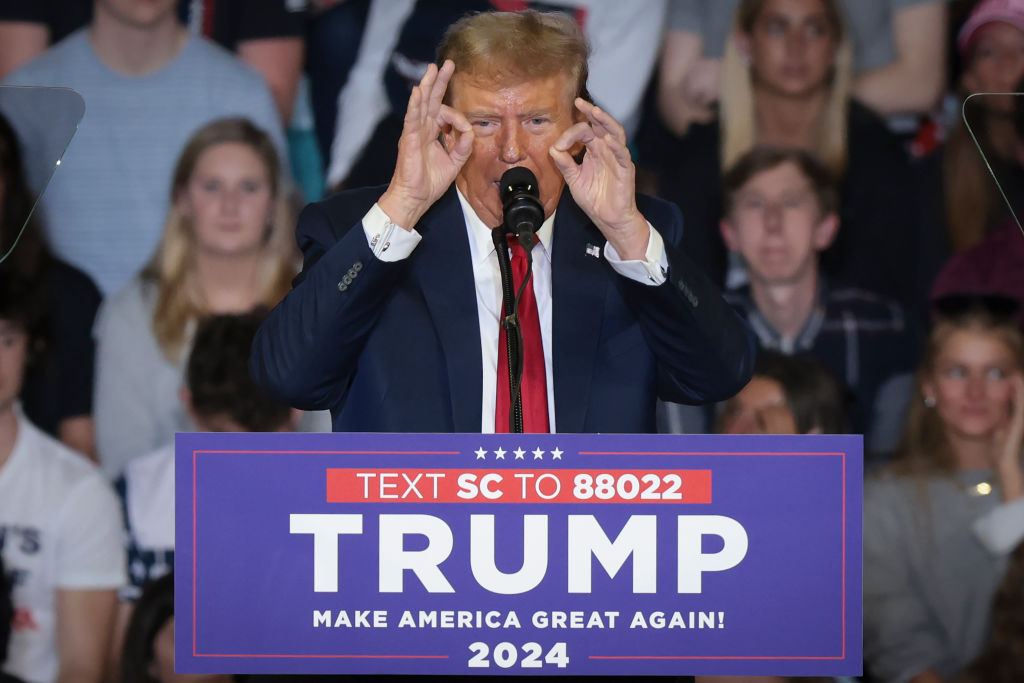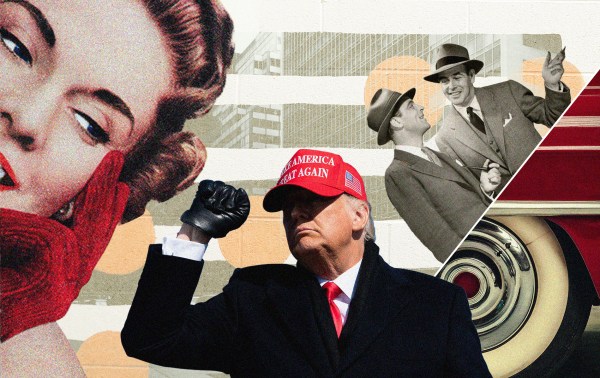Happy Thursday! Disgraced former GOP Rep. George Santos may be cleaning up on Cameo selling personalized video messages for $350 a pop, but he’s clearly still not over his old job.
After Republicans lost the special election to replace him earlier this week, Semafor reported he started a group chat with some of the lawmakers who pushed to oust him earlier this week—just to call them “f—ing idiots” and tell them he hopes they lose their own races. “Sorry new phone,” GOP Rep. Andrew Garbarino responded. “Who dis?”
Quick Hits: Today’s Top Stories
- Indonesian Defense Minister Prabowo Subianto is projected to win Wednesday’s presidential elections in the southeast Asian nation. “This victory must be a victory for all the Indonesian people,” he said in a victory speech yesterday. Subianto, a former general, served under the Suharto dictatorship, which ended in 1998. The minister has been linked to the killing and torture of Suharto’s opponents, among other rights abuses, sparking worries from some observers that Subianto’s presidency could lead to democratic backsliding. Subianto has pledged to continue the policies of his predecessor, President Joko Widodo (aka Jokowi), who backed him in the race. Jokowi is term limited, but his son, Gibran Rakabuming Raka, ran as Subianto’s vice president.
- Israeli Prime Minister Benjamin Netanyahu has decided not to send a follow-up delegation to Cairo, Egypt, to continue talks over a ceasefire with Hamas, describing the terrorist group’s demands as “delusional.” In a statement Wednesday, he said that “in Cairo, Israel did not receive any new proposal from Hamas on the release of our captives” and that only “a change in Hamas’ positions will allow progress in the negotiations.” Meanwhile, the Israel Defense Forces (IDF) launched a series of strikes Wednesday against Hezbollah targets in Lebanon, responding to a rocket attack on Safed, a city in northern Israel, that killed an Israeli soldier and wounded eight others, according to Israeli officials.
- President Joe Biden signed an executive order on Thursday preventing Palestinians in the U.S. from being deported for the next 18 months. Biden cited the risk to civilians in Gaza as justification for deferring deportations—an estimated 6,000 Palestinians will be eligible for the deferment. White House National Security Adviser Jake Sullivan said the order would give Palestiaians “a temporary safe haven.”
- House Intelligence Committee Chairman Mike Turner issued a cryptic request to the Biden administration on Wednesday, asking the White House to declassify information related to a “serious national security threat” and share information on the threat with lawmakers outside of the committee. Rep. Jason Crow, a Democrat on the Intelligence Committee, said the threat was “not an immediate crisis but certainly something we have to be very serious about.” House Speaker Mike Johnson pushed back on some of the hysteria that had spread after Turner’s request, saying there was “no need for public alarm.” Sullivan told reporters that briefings with lawmakers to discuss the threat were scheduled for Thursday, but that he is “not in a position to say anything further.” Unconfirmed reporting from anonymous sources suggests that the threat concerns Russian plans for a nuclear weapon in space that could target satellites.
- Special Counsel Jack Smith requested on Wednesday that the Supreme Court reject former President Donald Trump’s request to delay his criminal trial regarding his efforts to overturn the results of the 2020 election. The trial is currently delayed pending Trump’s appeal of a lower court Trump’s decision that he is not immune from prosecution. “Delay in the resolution of these charges threatens to frustrate the public interest in a speedy and fair verdict—a compelling interest in every criminal case and one that has unique national importance here, as it involves federal criminal charges against a former President for alleged criminal efforts to overturn the results of the Presidential election, including through the use of official power,” Smith wrote in a 40-page filing submitted Wednesday.
- One person was killed and at least 20 others (including 11 children) were injured on Wednesday during a shooting at the Kansas City Chiefs’ Super Bowl victory parade, near Kansas City’s Union Station. Police have apprehended three people in relation to the shooting, but no charges had been announced as of Thursday morning. “This is absolutely a tragedy the likes of which we would have never expected in Kansas City and the likes of which we remember for some time,” Kansas City Mayor Quinton Lucas said.
- Republican Rep. Mark Green of Tennessee announced Wednesday that he won’t seek re-election at the end of his third term. The 59-year-old lawmaker currently serves as the chair of the House Homeland Security Committee and spearheaded the House GOP’s effort to impeach Homeland Security Secretary Alejandro Mayorkas. “This place is so broken,” Green told Axios. “It feels like a lot of something for nothing.” He joins fellow retiring Republican House committee chairs Patrick McHenry, of the Financial Services Committee; Cathy McMorris Rodgers, of the Energy and Commerce Committee; and Kay Granger, of the Appropriations Committee, in leaving the lower chamber at the end of this term. Also on Wednesday, Rep. James Clyburn of South Carolina announced that he will step down as House Assistant Democratic Leader. He will still seek reelection in the fall.
Trump Threatens Cloudy Future for NATO

Addressing a crowd at a rally in South Carolina over the weekend, former President Donald Trump returned to one of his favorite objects of derision: the North Atlantic Treaty Organization (NATO). The former president recounted what he claimed was a real conversation between him and a leader of a “big” European country while Trump was still president. “‘Well, sir, if we don’t pay and we’re attacked by Russia, will you protect us?’” Trump said the leader asked, referring to NATO countries’ mutual defense obligations and members’ promise to spend 2 percent of their national GDP on defense.
“I said, ‘You didn’t pay? You’re delinquent?’” Trump said. “‘No, I wouldn’t protect you—in fact, I would encourage them to do whatever the hell they want. You gotta pay! You gotta pay your bills!’” His supporters reacted with uproarious applause.
The former president has never shied away from criticizing the multilateral defensive alliance, which celebrates its 75th birthday this year. Despite Trump’s longstanding disdain for the institution and repeated threats to withdraw the U.S. from the alliance, the United States remained a member throughout his presidency. But his comments over the weekend—some of his most strident vis-à-vis the alliance—brought into stark relief what a second Trump term could mean for the U.S.’s NATO membership. Though both Republicans and Democrats in Congress found it necessary last year to pass legislation barring a president from unilaterally removing the U.S. from the alliance, many Republicans have dismissed Trump’s recent comments encouraging a Russian attack on a NATO ally as unremarkable and typical Trumpian bloviation.
The scenario the former president described is something closer to a protection racket than the actual obligations of NATO membership. The alliance, now including 31 member states, was first established in 1949 as a bulwark against the threat of the Soviet Union. Article 5 of the organization’s founding treaty also created a requirement for mutual defense: An attack against one member would be considered an attack against all, though each country is offered considerable leeway to decide how it would rise to the defense of fellow members in such a case.
“Mr. Trump was implying that there’s a NATO budget and some nations are not paying their way,” explained Sean Monaghan, a visiting fellow at the Center for Strategic and International Studies who focuses on NATO and European security. “This is not how NATO works. There is a small NATO common funding budget, which funds offices and a small amount of collective capabilities, like surveillance aircraft, which all allies contribute to proportionately. But how NATO works is it’s an alliance, and every ally brings their own military to the party and puts their military forces on the table. And the idea is they would offer them in a crisis.”
Or, put another way: “This is not a pay-to-play relationship,” Kristine Berzina, the managing director of the German Marshall Fund’s Geostrategy North program, told TMD.
What explains the former president’s misrepresentation of NATO’s function? “I think he retreats to something he thinks he understands, which is dollars and cents, and on that kind of simplistic basis, that’s how he comes up with these conclusions,” John Bolton, Trump’s national security adviser from April 2018 to September 2019, told TMD.
Trump’s critiques of NATO have been frequent features of his campaigns and his presidency. In his 2020 memoir, The Room Where It Happened, Bolton described a moment at the 2018 NATO summit in Brussels, Belgium, when the president told his advisers he intended to announce he was withdrawing the U.S. from the alliance at a plenary session of the summit. Bolton and other aides pushed back: “‘So, go up to the line, but don’t cross it,’” Bolton recounted telling the president. Indeed, Trump did not withdraw the U.S. from the alliance that day or at any point in his presidency. “For the remainder of my tenure, it was just grumbling,” Bolton told TMD. “I attribute that to [a] short attention span. But now he’s making it a priority again, for whatever reason, and so I think it would be high on his list of things to do once he’s inaugurated, if he wins.”
A president’s personal vendetta against NATO is a risk congressional Republicans and Democrats alike have tried to forestall. The provision that Sens. Tim Kaine of Virginia and Marco Rubio of Florida introduced in the 2024 National Defense Authorization Act requires the advice and consent of the Senate—functionally, a vote—before “suspending, terminating, or withdrawing U.S. membership in NATO,” and sets up a mechanism to legally challenge any president who did so without congressional approval. “It is now more essential than ever for the United States to stand shoulder to shoulder with our NATO allies,” Rubio said of a similar measure in March 2022, just after Russia invaded Ukraine. “With Ukraine under siege, it is critical to reaffirm the importance of this alliance by ensuring that no U.S. president can withdraw from NATO without the Senate’s advice and consent.” (Bolton told TMD he isn’t satisfied with the measure, in part because he argues it’s unconstitutional, but also because he says a drawn-out, litigated, attempted withdrawal would have the same effect as the real deal.)
Even when Trump hasn’t been actively threatening to leave the alliance, the former president has often implored European allies to spend more on their own defense—sometimes in coarse terms. NATO Secretary General Jens Stoltenberg, like leaders of other European member states, grants that Trump and others’ longstanding critique of European defense spending is legitimate. “We have to listen and take note of the following: the criticism that we hear is not primarily about NATO,” Stoltenberg said Wednesday. “It is about NATO allies not spending enough. […] And that is a valid point […] that European allies and Canada have to spend more.”
But European allies have increased their spending—particularly over the last decade, including during the years Trump was president. Stoltenberg said Wednesday he expects 18 of the alliance’s 31 members, including the influential Germany, in 2024 to hit their goal of spending 2 percent of GDP on defense. That would be six times as many members as in 2014, the same year that Russian forces annexed Crimea in Ukraine. That year, NATO allies recommitted to their spending goals and many have stuck to them, in large part due to the increasingly precarious security situation on the continent. Poland, which shares a border with Ukraine, spent close to 4 percent of its GDP on defense in 2023, blowing past the U.S., for which military spending accounts for about 3.5 percent of GDP. When it comes to addressing the war in Ukraine, aid from the European Union and its member countries exceeds U.S. support in terms of raw giving. Several NATO allies, including Germany, the Baltic countries, and Finland, offered more than the U.S. as a percentage of their GDP, according to the Kiel Institute for the World Economy’s Ukraine Aid Tracker.
“I think the basic reason why Europeans spent dramatically more money on defense since 2014 was because of Mr. Putin’s behavior: annexation of Crimea, the attacks on European democracies, cyber attacks, hybrid attacks, and then, of course, the invasion of Ukraine in 2022,” Monaghan told TMD. “[W]hat drives national defense spending is the security environment and the threats that are faced by those nations and clearly, since 2014, the threat of Mr. Putin taking violent action has been dramatically increased. So, Mr. Trump’s words do resonate in Europe, but they are not the primary driver of European defense investment.”
Encouraging NATO members to boost their defense outlays may be a worthwhile goal, but Trump has also frequently questioned the wisdom of the Article 5 commitment—once saying, for example, that defending an “aggressive” Montenegro, which became a member in 2017, would cause World War III and that’s “the way [NATO] was set up.” Supporters of the alliance are concerned that undermining Article 5—and going so far as to encourage Putin to attack allies, as Trump did last weekend—crosses a line. It may, they argue, blunt the alliance’s deterrent effect on Putin or Chinese President Xi Jinping. Stoltenberg echoed that sentiment in even starker language. “Any suggestion that allies will not defend each other undermines all of our security, including that of the U.S.,” he said. “And puts American and European soldiers at increased risk.”
But several of the former president’s allies in Congress—including historically hawkish Republicans—dismissed the idea that Trump’s outburst was in any way remarkable, leaning on an old method of interpreting the former president: that he should be taken “seriously, but not literally,” as Sen. John Cornyn of Texas told ABC News. Cornyn did add, perhaps in a soft sort of criticism, that “the message should be that the United States will live up to its treaty obligations no matter who is president.”
The usually hawkish Republican Sen. Lindsey Graham of South Carolina skipped the criticism. “Give me a break—I mean, it’s Trump,” he said on Monday. “All I can say is while Trump was president nobody invaded anybody. I think the point here is to, in his way, to get people to pay.”
Asked by CNN’s Jake Tapper if he was comfortable with the former president suggesting he’d invite Putin and Russia to invade NATO allies, Rubio said, “Well, that’s not what happened, and that’s not how I view that statement.”
“Donald Trump was president, and he didn’t pull us out of NATO,” added Rubio, one of the authors of the bill aimed at keeping a president from leaving NATO, introduced after the former president left office.
So what does it mean in this case, to take the former president seriously, but not literally? “Through experience, we’ve seen that Trump says things and he does mean them literally,” Bolton told TMD. “Beside that, when you’re president or a presidential candidate, the rest of the world looks at your words and so they do take it literally. And a responsible politician acts accordingly—it doesn’t mean you have to change your position, but it means you have to think of the implications of what you say, and Trump does not think in those terms.”
There are other ways Trump could weaken the military alliance short of withdrawing from it—failing to appoint a U.S. ambassador to the organization, declining U.S. participation in NATO exercises, or refusing to put in place an American Supreme Allied Commander of NATO. But Bolton predicts an all-or-nothing approach to the alliance if Trump is reelected. “From Trump’s point of view, the withdrawal has one big advantage,” Bolton told TMD. “The headline, ‘Trump Undercuts NATO,’ isn’t much of a headline. ‘Trump Withdraws from NATO’—that’s a headline.”
Worth Your Time
- Writing for The Atlantic, Derek Thompson explored Americans’ increasing social isolation. “In its earliest decades, the United States was celebrated for its citizens’ extroversion,” he wrote. “Americans weren’t just setting out to build new churches and new cities. Their associations were, as Alexis de Tocqueville wrote, ‘of a thousand different types … religious, moral, serious, futile, very general and very limited, immensely large and very minute.’ Americans seemed adept at forming social groups: political associations, labor unions, local memberships. … After the 1970s, American dynamism declined. Americans moved less from place to place. They stopped showing up at their churches and temples. In the 1990s, the sociologist Robert Putnam recognized that America’s social metabolism was slowing down. In the book Bowling Alone, he gathered reams of statistical evidence to prove that America’s penchant for starting and joining associations appeared to be in free fall. Book clubs and bowling leagues were going bust. If Putnam felt the first raindrops of an antisocial revolution in America, the downpour is fully here, and we’re all getting washed away in the flood. From 2003 to 2022, American men reduced their average hours of face-to-face socializing by about 30 percent. For unmarried Americans, the decline was even bigger—more than 35 percent. For teenagers, it was more than 45 percent. Boys and girls ages 15 to 19 reduced their weekly social hangouts by more than three hours a week. In short, there is no statistical record of any other period in U.S. history when people have spent more time on their own.”
Presented Without Comment
NBC News: Biden Attacked Hur for Asking Him When [His Son] Beau Died. That Didn’t Happen, Sources Say.
President Joe Biden lashed out at Robert Hur last week over one particular line in the special counsel’s report on his handling of classified documents: that Biden “did not remember, even within several years, when his son Beau died.”
“How in the hell dare he raise that?” Biden told reporters in an impromptu White House press conference. “Frankly, when I was asked the question, I thought to myself, it wasn’t any of their damn business.”
But Hur never asked that question, according to two people familiar with Hur’s five-hour interview with the president over two days last October. It was the president, not Hur or his team, who first introduced Beau Biden’s death, they said.
Also Presented Without Comment
The Hill: Trump Sends Valentine’s Day Message to Melania Centered on His Criminal Cases
Toeing the Company Line
- In the newsletters: The Dispatch Politics crew reported on Democrat Tom Suozzi’s win in Tuesday’s special election in New York, Scott explored (🔒) the failings of U.S. aluminum tariffs, and Nick highlighted some takeaways from Republicans’ latest high-profile electoral losses.
- On the podcasts: Sarah and David dig into the Hawaii Supreme Court’s latest Second Amendment decision on Advisory Opinions, and substitute Remnant host Chris Stirewalt is joined by Ruy Teixiera, author of Where Have All the Democrats Gone? and a senior fellow at the American Enterprise Institute, to discuss what the wretched state of our parties could mean for the 2024 election.
- On the site today: Drucker reports on the (all-but-certainly doomed) future of immigration reform after Republicans tanked the latest bipartisan push in recent weeks.
Let Us Know
Do you think Trump’s comments about NATO should be taken literally or viewed as a negotiation tactic?






Please note that we at The Dispatch hold ourselves, our work, and our commenters to a higher standard than other places on the internet. We welcome comments that foster genuine debate or discussion—including comments critical of us or our work—but responses that include ad hominem attacks on fellow Dispatch members or are intended to stoke fear and anger may be moderated.
With your membership, you only have the ability to comment on The Morning Dispatch articles. Consider upgrading to join the conversation everywhere.